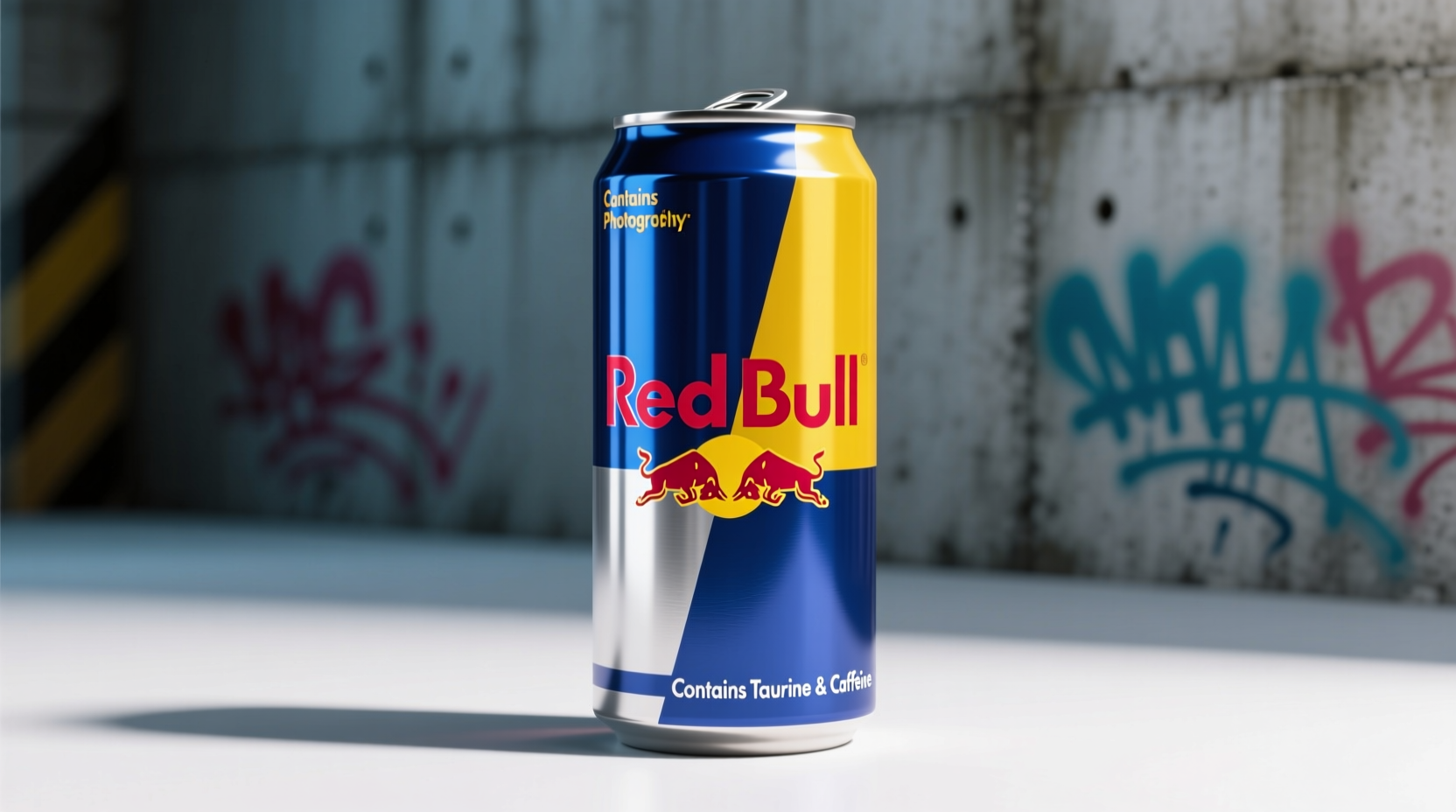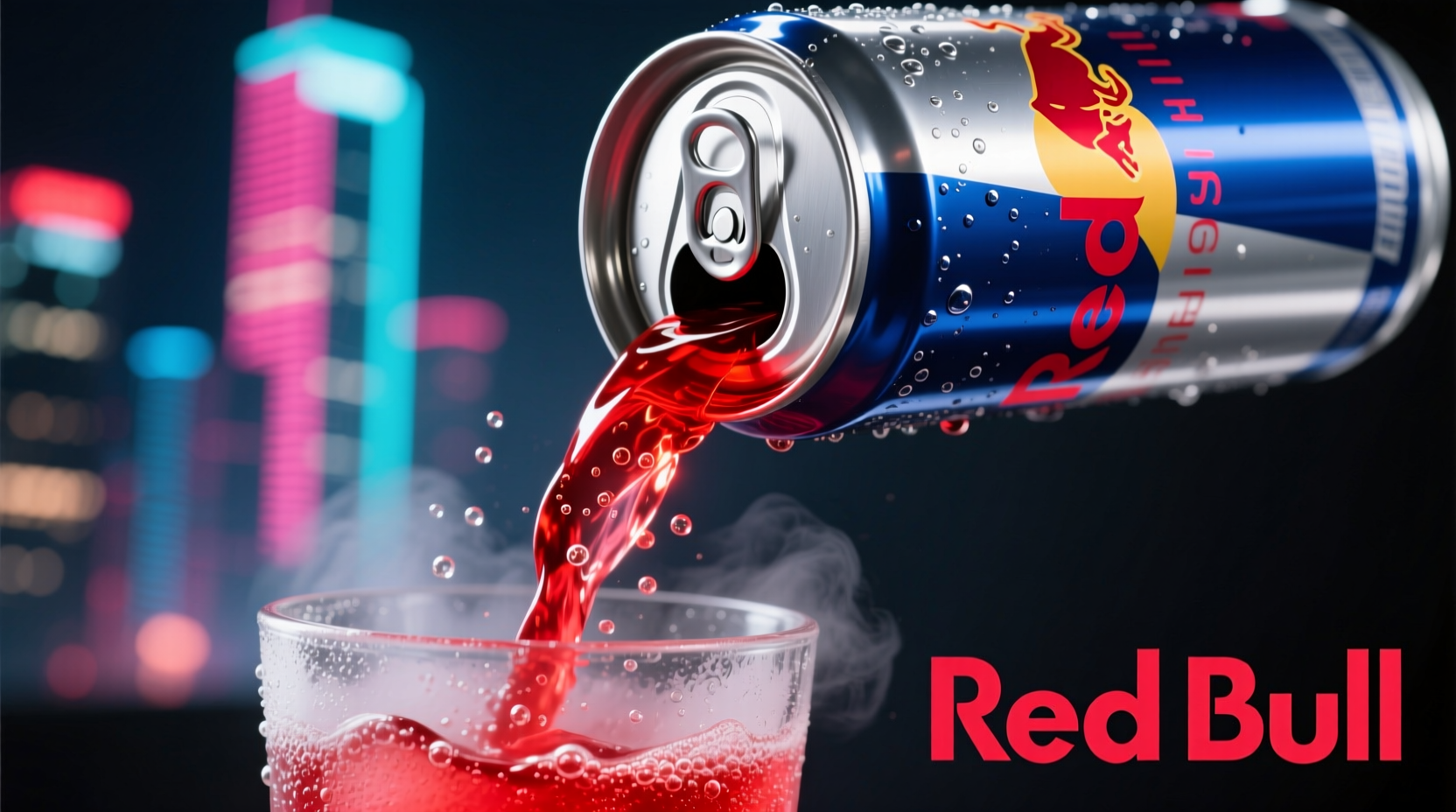When you crack open a can of Red Bull, you're immediately greeted by a vibrant yellow hue and a burst of carbonation that carries citrus aromas. But what does Red Bull taste like in precise sensory terms? Let's break down the complete flavor experience that has made this energy drink a global phenomenon.
The Complete Sensory Profile of Red Bull
Understanding Red Bull's taste requires examining multiple dimensions of the drinking experience. The flavor profile unfolds in distinct stages from first sip to aftertaste, creating a complex sensory journey that explains why some people love it while others find it challenging.
Initial Flavor Impact
The first sensation when drinking Red Bull is a pronounced sweetness balanced with bright citrus notes. The dominant flavors are lemon and what many describe as a generic "berry" undertone, though the exact berry note remains somewhat ambiguous. This initial sweetness comes from the substantial sugar content in the original version (27g per 8.4oz can), creating an almost syrupy mouthfeel that coats the tongue.
"Red Bull's flavor profile is intentionally engineered to be both refreshing and energizing," explains Antonio Rodriguez, culinary expert with expertise in flavor chemistry. "The citrus notes provide immediate sensory stimulation while the sweetness triggers dopamine release, creating that 'reward' sensation people associate with energy drinks."
Carbonation and Mouthfeel
Red Bull features moderate carbonation—less aggressive than most sodas but more pronounced than many other energy drinks. This creates a tingling sensation that enhances the perception of freshness. The carbonation level serves a functional purpose too, helping to mask some of the more medicinal notes from the functional ingredients.
| Energy Drink | Carbonation Level | Sweetness Perception | Distinctive Flavor Notes |
|---|---|---|---|
| Red Bull Original | Moderate | High (27g sugar/8.4oz) | Lemon, berry, slight medicinal |
| Red Bull Sugarfree | Moderate-High | Medium-High (artificial sweeteners) | Sharper citrus, more metallic aftertaste |
| Monster Energy | High | Very High (33g sugar/16oz) | Apple, tropical fruit, less medicinal |
| Rockstar Original | Medium | Very High (63g sugar/16oz) | Cherry, apple, more syrupy |
Mid-Palate Development
As the initial sweetness settles, more complex notes emerge. This is where Red Bull's distinctive character becomes apparent. Many tasters detect subtle berry undertones—reminiscent of raspberry or blackberry—but these are intentionally vague to create a unique, hard-to-define flavor profile. The citric acid provides a balancing tartness that prevents the drink from being cloying.
The Controversial Aftertaste
Perhaps the most distinctive element of Red Bull's taste is its aftertaste, which many describe as slightly medicinal or "chemical." This comes primarily from the taurine and B-vitamins in the formula. Taurine, an amino acid that contributes to the energy-boosting properties, has a naturally bitter quality that becomes more noticeable as the initial sweetness fades.
According to research published in the Journal of Food Science, the specific combination of taurine (1000mg per can), glucuronolactone (600mg), and B-vitamins creates a flavor interaction that many consumers initially find challenging but often grow accustomed to with repeated exposure. This explains why Red Bull has such polarizing reviews—people either adapt to the aftertaste or reject it entirely.

How Ingredients Shape Red Bull's Unique Taste
Understanding what does Red Bull taste like requires examining its ingredient list and how these components interact:
- Sugar (original version): Provides the dominant sweetness that masks some of the more challenging medicinal notes
- Sucralose (sugar-free version): Creates a sharper, more artificial sweetness with a longer-lasting aftertaste
- Citric acid: Balances sweetness with tartness and enhances the perception of freshness
- Natural flavors: The proprietary blend responsible for the distinctive citrus-berry profile
- Taurine: Contributes to the slightly bitter, medicinal aftertaste
- B-vitamins: Add subtle metallic notes, particularly noticeable in the aftertaste
- Caffeine: Provides bitterness that balances the sweetness
Regional Variations in Red Bull's Flavor Profile
What does Red Bull taste like can actually vary depending on where you are in the world. The formula differs slightly between regions due to local regulations and taste preferences:
| Region | Sugar Content | Notable Flavor Differences | Regulatory Factors |
|---|---|---|---|
| United States | 27g per 8.4oz can | Sweeter, more pronounced citrus | Higher caffeine limit (80mg) |
| European Union | 26g per 8.4oz can | Slightly less sweet, more balanced | Lower caffeine limit (32mg) |
| Canada | 26g per 8.4oz can | More pronounced berry notes | Additional labeling requirements |
| Australia | 25g per 8.4oz can | Milder aftertaste | Modified ingredient restrictions |
These subtle variations explain why travelers sometimes comment that Red Bull "tastes different" when consumed abroad. The European version, for example, has slightly less sugar and caffeine, resulting in a more balanced flavor profile that many find less overwhelming than the American formulation.
How Temperature Affects Red Bull's Taste Experience
What does Red Bull taste like is significantly influenced by temperature. When served ice-cold (34-38°F / 1-3°C), the sweetness is less pronounced and the carbonation feels more refreshing. The colder temperature also suppresses some of the more challenging medicinal notes.
At room temperature, Red Bull's sweetness becomes more apparent, and the medicinal aftertaste is significantly more pronounced. This explains why energy drinks are almost always consumed chilled—both for taste reasons and because cold beverages are perceived as more refreshing.
Comparing Red Bull to Other Energy Drinks
Understanding what does Red Bull taste like requires context through comparison with other popular energy drinks:
- Monster Energy: Sweeter and fruitier with more pronounced apple and tropical notes; less noticeable medicinal aftertaste
- Rockstar: Much sweeter with cherry and apple notes; syrupier mouthfeel; less carbonation
- 5-hour Energy: Extremely concentrated with a much stronger medicinal taste; no carbonation
- Matcha Bar Hustle: Cleaner, more natural sweetness with distinct green tea notes; less artificial aftertaste
What makes Red Bull distinctive in the energy drink market is its specific balance of citrus notes and that characteristic aftertaste. While many newer energy drinks have moved toward cleaner, more natural flavor profiles, Red Bull has maintained its original taste profile for decades—a decision that has both loyal fans and vocal critics.
When Taste Perception Changes: Context Matters
Your experience of what Red Bull tastes like can vary dramatically based on context:
- On an empty stomach: The sweetness feels more intense and the medicinal notes are more pronounced
- After physical activity: The electrolytes and sugars taste more refreshing and necessary
- When fatigued: The flavor may seem more appealing due to the body's craving for quick energy
- With food pairing: Works surprisingly well with salty snacks like pretzels or nuts, which balance the sweetness
Food scientists at the Institute of Food Technologists note that energy drink flavor perception is highly context-dependent. Their research shows that when consumers are physiologically fatigued, they rate the same energy drink as 23% more palatable than when they're well-rested—a phenomenon that explains why Red Bull often tastes "better" when you're genuinely tired.
Does Sugar-Free Red Bull Taste Different?
Many consumers wonder what does sugar free Red Bull taste like compared to the original. The answer is yes—it has a noticeably different profile:
- More pronounced carbonation
- Sharper, more artificial sweetness from sucralose
- More noticeable metallic aftertaste
- Less rounded mouthfeel
- Slightly more acidic perception
The absence of sugar changes how the other ingredients interact on your palate. Without sugar's mouth-coating effect, the taurine and B-vitamins become more immediately apparent, which is why many people find the sugar-free version has a more challenging flavor profile.
Why Red Bull's Taste Has Remained Consistent for Decades
Unlike many consumer products that reformulate to match changing tastes, Red Bull has maintained nearly identical flavor profile since its introduction. Market research firm Nielsen reports that 78% of regular Red Bull consumers strongly prefer the original taste and would switch brands if significant changes were made.
This brand consistency has created what food psychologists call "flavor memory anchoring"—consumers associate the specific taste with the energy boost, creating a powerful psychological connection between flavor and function. Changing the taste would disrupt this established association, potentially reducing perceived effectiveness.
Practical Tips for First-Time Red Bull Drinkers
If you're wondering what does original Red Bull taste like and plan to try it for the first time, consider these tips to optimize your experience:
- Chill thoroughly before drinking (best at 34-38°F / 1-3°C)
- Drink in one sitting rather than sipping slowly (prevents the aftertaste from becoming overwhelming)
- Have it with a salty snack like pretzels to balance the sweetness
- Don't drink on an empty stomach if you're sensitive to strong flavors
- Try the sugar-free version only if you regularly consume diet beverages
Understanding Red Bull's Flavor Evolution
While the core Red Bull flavor has remained consistent, the brand has expanded its product line with various flavors that maintain the signature energy profile while offering different taste experiences:
| Product | Flavor Profile | Key Differences from Original |
|---|---|---|
| Red Bull Cola | Classic cola with subtle citrus notes | Less sweet, more pronounced cola flavor, reduced medicinal aftertaste |
| Red Bull Blueberry | Bright blueberry with citrus undertones | Sweeter berry profile, less prominent lemon notes |
| Red Bull Peach Nectar | Juicy peach with tropical notes | Softer sweetness, creamier mouthfeel, less carbonation |
| Red Bull Simply Cola | Natural cola flavor | Less artificial aftertaste, more complex spice notes |
Despite these variations, the original Red Bull flavor remains the company's flagship product, accounting for approximately 65% of global sales according to Beverage Marketing Corporation data.
Final Thoughts on Red Bull's Distinctive Flavor
What does Red Bull taste like ultimately depends on your palate and context, but its signature sweet-citrus profile with that distinctive medicinal aftertaste has become instantly recognizable worldwide. The flavor represents a careful balance between immediate refreshment and functional ingredients—a formula that has remained remarkably consistent while the energy drink market has evolved around it.
Whether you're a longtime fan or considering your first can, understanding the complete flavor profile helps set appropriate expectations. Red Bull isn't designed to be a "perfect" tasting beverage—it's engineered to deliver specific functional benefits with a flavor profile that has proven remarkably durable in the global marketplace.











 浙公网安备
33010002000092号
浙公网安备
33010002000092号 浙B2-20120091-4
浙B2-20120091-4